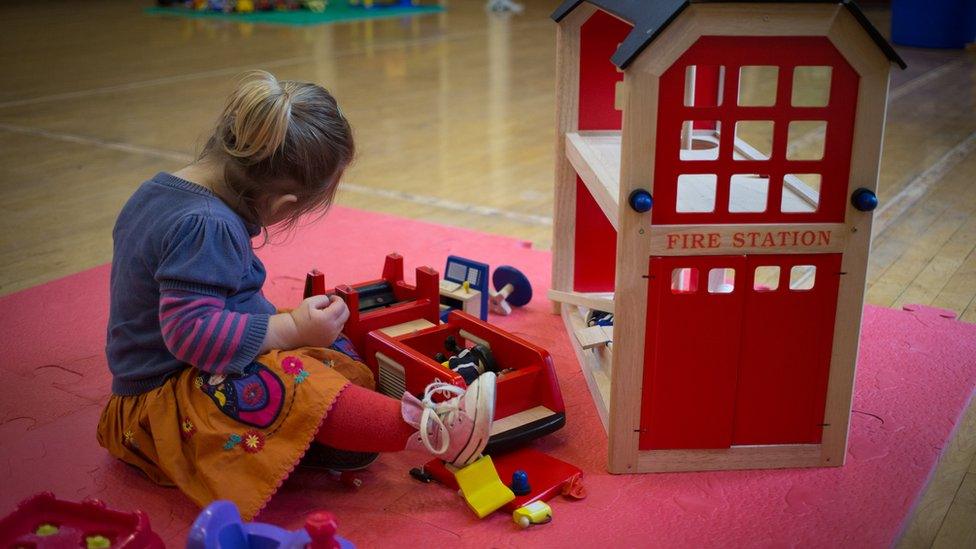Doubling of free childcare 'could force nurseries to close'
- Published

Half of childcare providers fear for the viability of their businesses under plans to double free hours
Nearly 750 childcare providers say they fear being put out of business by government plans to double free hours, says the Pre-school Learning Alliance.
In 2017, free care for three-and four-year-olds in England will rise from 15 to 30 hours in each term-time week.
But childcare providers say the scheme is underfunded, and 49% of 1,500 who chose to respond to an online survey said they could be forced to close.
Ministers say many providers are keen to take part in the scheme.
The Pre-School Learning Alliance sent out an online questionnaire to members last month.
Of almost 1,500 who replied:
Nearly 750 of the 1,500 (49%) said they feared having to close because of the plan, with a further 1% already planning to do so
58% said it would have a negative financial impact on their business
50% feared they lacked the capacity to offer twice as many free places
48% said it would force them to cut places for other age groups.
Almost all the respondents (98%) said they were already offering the 15 hours of free childcare, but only a third said they would definitely offer the 30 hours, with 19% saying they definitely would not and a further 51% unsure.
Local authorities are responsible for ensuring there is enough nursery provision, but a National Audit Office report, external last month warned councils might struggle to find providers willing to offer the 30 free hours for all eligible children.
The report also highlighted childcare providers' concerns about funding levels.
"Though they are keen to offer the new entitlement, some providers may choose not to if the funding is not right," it said.
"There is also a risk that childcare settings could choose to offer additional hours to three- and four-year-olds by reducing the number of disadvantaged two-year-olds they look after, as two-year-olds are more expensive to care for."

The Pre-school Learning Alliance says the survey results are a stark warning
The survey findings have been published as MPs prepare to discuss the issue at the Public Accounts Committee., external
"These figures are a stark warning of what could happen if the government insists on rolling out an underfunded, under-resourced free entitlement offer," said Pre-school Learning Alliance chief executive Neil Leitch.
"Given that the move to 30 hours means that most providers will no longer be able to cross-subsidise in order to plug this gap, it's no surprise that so many are fearing for their future.
Mr Leitch said the government could not expect providers to put the sustainability of their business "at risk" to fulfil a promise that "wasn't properly thought through".
'First step'
He welcomed government plans to boost the average hourly rates paid to providers for this age group to £4.88 as "an important first step" but added that cost pressures, such as the introduction of the national living wage, would still leave "a significant funding gap".
Ministers say the concerns raised by the survey do not match what they are seeing on the ground, with "huge levels of interest" in helping trial the scheme.
A Department for Education spokeswoman said the government would be spending "£6bn a year by the end of this parliament, to make sure more families than ever before have help with their childcare needs".
The spokeswoman said the government would raise average funding after extensive consultation and "the most comprehensive analysis of this market ever".
"We will also be consulting on fairer funding allocations, including the introduction of an early-years national funding formula, and making sure more money reaches the front line instead of being top-sliced by councils," she added.
- Published15 March 2016

- Published17 February 2016

- Published24 February 2016

- Published26 November 2015
